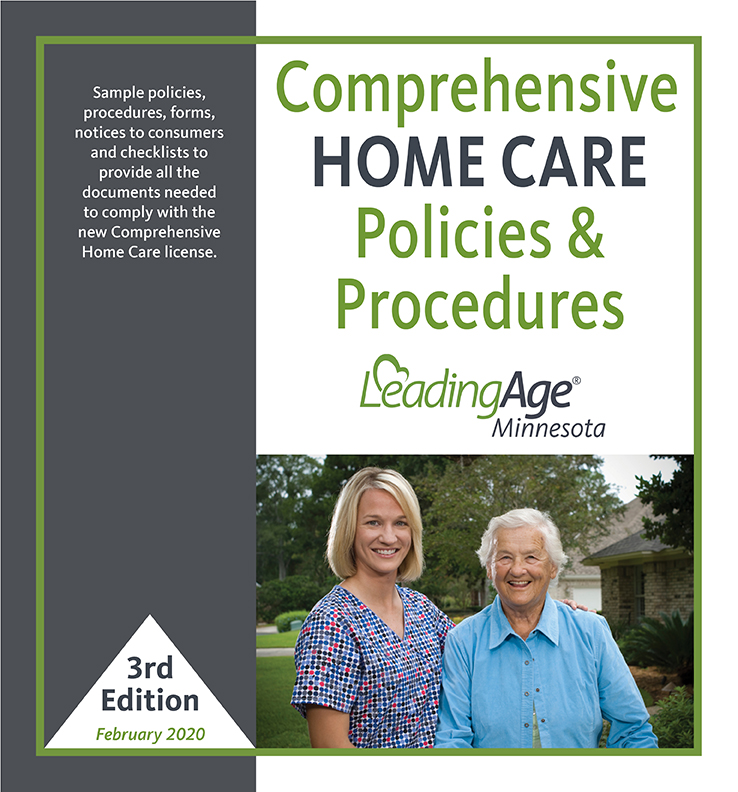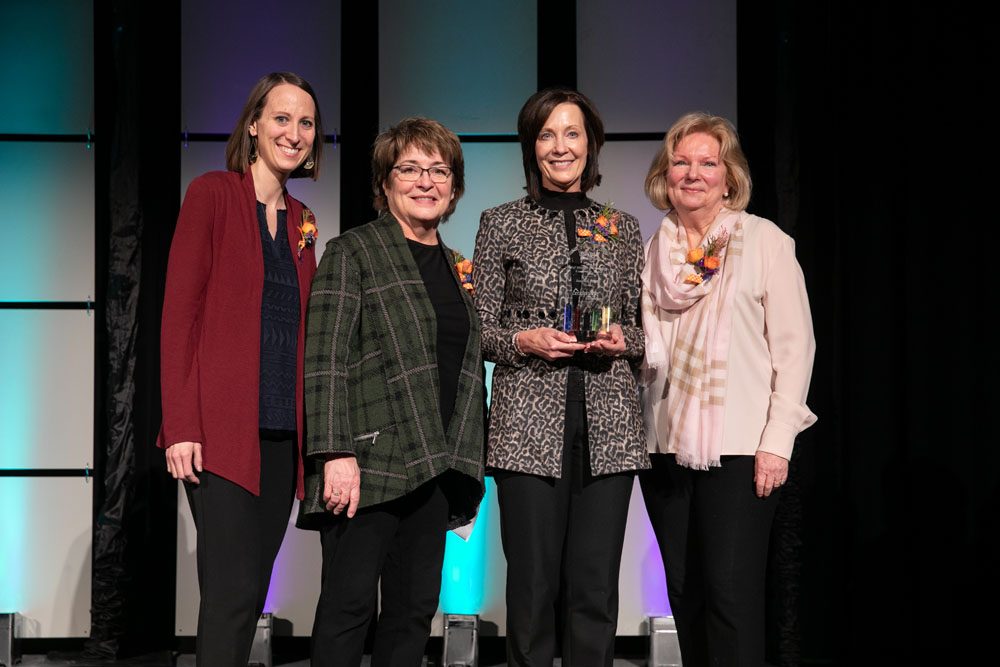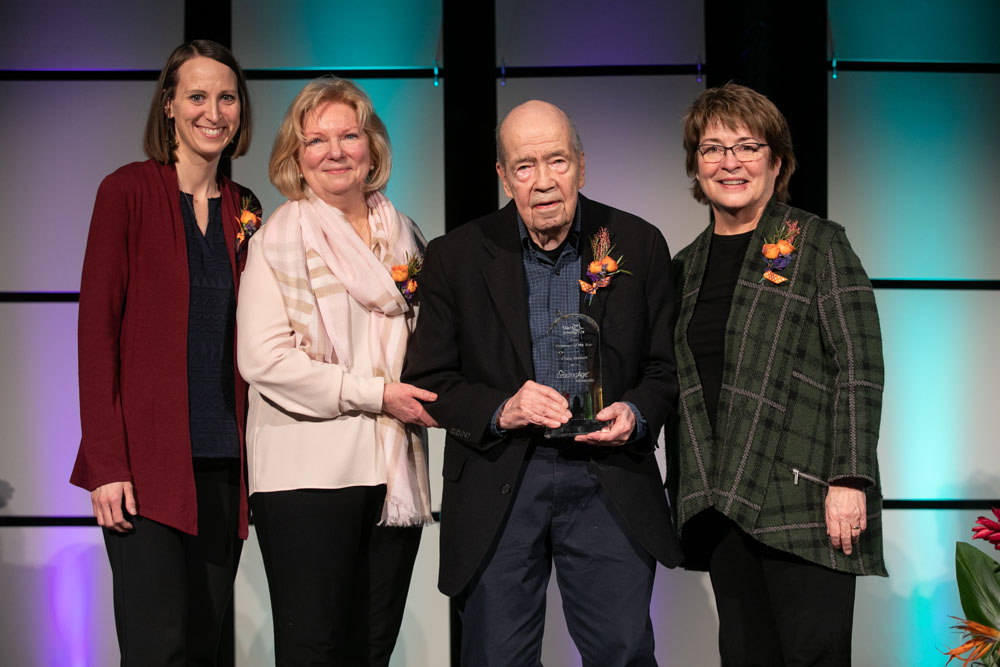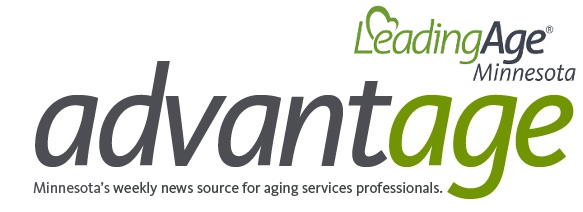Feb. 26, 2020
Featured News
CMS Accelerates Denial of Payment Remedy for Harm Level Citations
On February 25, 2020 by Jonathan Lips
Effective March 1, the Minnesota Department of Health (MDH) will impose Discretionary Denial Payment for New Admissions (DDPNA) on an accelerated basis for actual-harm level citations. The CMS-Chicago regional office has directed survey agencies in all Region V states (Illinois, Indiana, Michigan, Minnesota, Ohio, Wisconsin) to implement this new policy, citing a heightened level of surveys resulting in a deficiency at scope/severity level G or above during federal fiscal year 2019.
We spoke this week with staff in the CMS-Chicago office to understand this enforcement policy and to advocate for our care center members, and here is what we know so far:
When will the remedy be imposed?
Effective March 1, MDH will impose DDPNA effective 15 days from the date of the State’s notice imposing the remedy, if the situation meets any one or more of the following criteria (set out in the CMS State Operations Manual, Chapter 7, section 7304.1):
- Immediate Jeopardy (IJ) (scope and severity levels J, K, and L) is identified on the current survey; OR
- Any deficiency from the current survey at levels “G, H or I” that falls into any of the regulatory sections that constitute Substandard Quality of Care (SQC); OR
- Any deficiency at “G” or above on the current survey AND if there were any deficiencies at “G” or above on the previous standard health or LSC survey or if there was any deficiency at “G” or above on any type of survey between the current survey and the last standard health or LSC survey. These surveys (standard health or LSC, complaint, revisit) must be separated by a certification of compliance, i.e., they must be from different noncompliance cycles. For instance, level G or above deficiencies from multiple surveys within the same noncompliance cycle must not be combined to make this a “double G or higher” determination; OR
- A facility classified as a Special Focus Facility (SFF) AND has a deficiency citation at level “F,” (excluding any level “F” citations under tags F812, F813 or F814) or higher for the current health survey or “G” or higher for the current Life Safety Code (LSC) survey.
CMS-Chicago plans to take this approach to DDPNA for two years, and it will monitor survey results during that period to determine whether the approach is effective at reducing the number of harm-level citations.
Will providers receive fines in additional to denial of payment?
CMS will continue to impose civil money penalties (CMPs) in addition to DDPNA in the cases noted above, except for those that only meet the “single G” criteria. In single-G cases, the general practice will be to impose DDPNA instead of a CMP, which is positive.
Is there an opportunity to correct before the denial of payment remedy takes effect?
Yes. DDPNA will not automatically take effect in every case where MDH gives notice of the remedy. Providers will have 15 days from the date it receives notice of the remedy to correct the deficient practice. While this will be a very short time frame in which to create and implement an approved plan of correction, providers who receive notice of the remedy will have the opportunity to correct within that time frame and avoid DDPNA from taking effect. CMS intends for this accelerated application of DDPNA to serve as an incentive for providers to return to a state of substantial compliance quickly and to maintain compliance after-the-fact.
Will the state survey agency be required to conduct a revisit within those initial 15 days?
No. While CMS acknowledges that states may receive additional calls or pressure from providers asking for revisits to be conducted, CMS does not expect the States to conduct a revisit any sooner than is currently required. However, state surveyors will continue to have the ability to verify substantial compliance as of a date prior to the revisit, if the provider presents sufficient evidence of that compliance. While MDH has worked to conduct revisits prior to a setting's date certain when it can, we don’t know how it will manage these situations and we are working to learn more from the Department.
Survey exit conferences will be more important than ever, given this enforcement policy. What can we do to ensure those conferences provide meaningful information?
We strongly emphasized this point in our phone call with CMS, noting that thorough and clear exit conferences are critical from both a compliance and prevention standpoint, in that they allow providers to jump start a root cause analysis and development of an action plan.
Is this a national policy?
No. Each CMS regional office may determine its own approach to DDPNA. However, the policy being implemented by Region V is already in place in Region VI (Arkansas, Louisiana, New Mexico, Oklahoma, Texas) and Region VII (Iowa, Kansas, Missouri, Nebraska).
What should providers do next?
We will share additional insights in the coming days. In the meantime, we advise members to do the following:
- Advocate with surveyors for a clear and thorough exit conference. While surveyor practice is not to identify specific scope and severity (except in the case of IJ), they should be able to tell you if they have a concern about actual harm (e.g. harm arising from pressure ulcers), which would allow you to take action quickly.
- Read all communications from MDH carefully, with a particular eye to what remedies MDH is imposing and with what effective dates. It has been standard practice for 2567 transmittal letters to note that mandatory denial of payment for new admissions will take effect if substantial compliance is not achieved within 90 days, but this enforcement policy relates to discretionary denial of payment for new admissions, effective after 15 days. Read carefully to be sure you don’t accidentally interpret a 15-day notice of DDPNA as the same as the 90 day notice of mandatory denial of payment.
- If you receive a citation scope/severity level G or above and MDH imposes DDPNA, work to submit your plan of correction to MDH as soon as you can, and push them to approve it as soon as they can. The sooner you have an approved plan, the more time you will have to implement the plan prior to the remedy taking effect.
We are continuing to gather information, analyze the potential impact of this new DDPNA policy and advocate for providers on this issue. Among other steps, we are meeting on Feb. 28 with staff from LeadingAge affiliates in the other Region V states and the LeadingAge national team to discuss issues and strategies.
Please contact Jon Lips (jlips@leadingagemn.org) with any questions.
Do the Right Thing: Rapid Evaluation Teams
On February 25, 2020 by Julie Apold
Safe Care for Seniors has released a new training video that will help staff know the right thing to do when they find a resident unresponsive or respond to urgent or unexpected situations. The 10-minute Rapid Evaluation Team video demonstrates a real-life scenario, provides an implementation action plan, and showcases the positive outcomes Carris Health Care Center & Therapy Suites in Willmar is experiencing as a result of this process.
Some of most common reports received by the Office of Health Facility Complaints (OHFC) are related to change in resident condition. Safe Care for Seniors is committed to reducing this area of concern through Rapid Evaluation Teams (RETs), which helps an organization improve how staff call for and receive support to rapidly evaluate and address a change in a resident’s condition before it becomes an emergency.
“Knowing what to do in any situation is crucial to the care that we deliver,” said Amanda Thorson, Director of Nursing, Carris Heath Care Center & Therapy Suites, Willmar. “RETs really change the culture of a setting so that everyone knows they can make a difference. They help everybody work together as a team, feel more confident in their response and know there are resources readily available to support them.”
“As a nurse. you are more confident that you are able to focus and do everything you can for that patient in that time. RETs helps everyone feel they are involved in a patient’s care and that they are making a difference in that person’s life,” said Letty Morales Sanchez, Registered Nurse, Carris Health Care Center & Therapy Suites.
A RET Roadmap can be used in conjunction with the training video to help you and your team evaluate and adapt your current response process to make it more systematic and effective. Access the video and RET Roadmap at the Safe Care for Seniors Education & Training webpage.
Contact Julie Apold at japold@leadingagemn.org if you have questions or need support.
State News
Ecumen Advances Sanctuary Services Bill at State Capitol
On February 25, 2020 by Libbie Chapuran
Ecumen advanced legislation last week to launch a pilot project that will provide, short-term shelter, safety and advocacy for older adults affected by elder abuse.
The bill provides funding to develop a three-year pilot program that will utilize Ecumen housing and care centers as designated sites for Minnesota’s Sanctuary Services to promote the welfare of older adults living in and around our communities.
Ecumen anticipates piloting the project at four regional sites: Detroit Lakes, North Branch, Apple Valley, and Mankato. Ecumen will join the SPRiNG Alliance to assist in providing additional services, such as advocacy and case management. At the end of each year of the pilot, results will be reported to the Legislature.
The bill passed the Senate Family Care and Aging Committee. Its next stop will be the Senate Committee on Human Services Reform.
Thank you to Ecumen for leading through public policy. LeadingAge Minnesota is proud to support you at the Capitol and we look forward to the important work you will do through this innovative program.
Federal News
CMS Proposes Revisions to PASRR Rule
On February 25, 2020 by Jonathan Lips
The Centers for Medicare & Medicaid Services (CMS) published a proposed rule on Feb. 20 that would revise requirements for Preadmission Screening and Resident Review (PASRR). While many of the changes seek to clarify or reinforce requirements already in statute, this overhaul could have significant implications for nursing homes.
The PASRR process assesses the needs of individuals with mental illness or intellectual disability applying to or residing in Medicaid-certified nursing homes. The purpose of this process is to ensure that individuals are not placed in nursing homes unnecessarily or without adequate services to support successful maintenance in the environment.
The PASRR program was created as part of the Omnibus Budget Reconciliation Act of 1987 (OBRA ’87) and this proposed rule represents the first significant revision of the program since implementation.
LeadingAge has prepared an analysis highlighting key components of the proposed rule. Some of the proposed changes reflect actual changes to the rule and program, while other proposed changes simply clarify existing statutory requirements.
The PASRR program is ultimately implemented at the state level through the state Medicaid authority, and the proposed rule leaves opportunity for states to tailor some aspects of the program to fit the individual state’s needs and resources. We have reached out to the Minnesota Department of Human Services to request a meeting to review the proposed changes together.
Feedback to CMS is due by April 20. LeadingAge will be soliciting feedback from members and coordinating with other stakeholder groups as it prepares formal comments on the rule. We will provide additional information in the coming weeks.
MFAR Receives Bipartisan Pushback on Capitol Hill
On February 25, 2020 by Jodi Boyne
There are strong bipartisan concerns from federal lawmakers about the proposed federal rule that could eliminate up to $50 billion from the Medicaid program annually and have serious implications on aging services providers’ supplemental payments.
Republican and Democrat lawmakers alike are telling the Centers of Medicare & Medicaid Services (CMS) that the Medicaid Fiscal Accountability Regulation (MFAR) would have a detrimental effect on eligibility and access to care, as well as create havoc for state budgets. One group of lawmakers called on CMS to withdraw or revise the rule. LeadingAge has also demanded that the regulation be withdrawn.
CMS continues to defend the proposed rule, stating that it is not intended to reduce Medicaid payments but “strengthen accountability and increase transparency to ensure that every Medicaid dollar is claimed and spent in accordance with federal law while supporting the interests of Medicaid recipients.”
Notable News
The Real Truth of PDPM: HDG Provides Early Learnings for Senior Leadership
On February 25, 2020 by Jodi Boyne
It’s been five months since the Patient-Driven Payment Model (PDPM) went live. What have we learned since then? Let’s check in with Health Dimensions Group, who recently shared some early learnings at our Institute & Expo and recapped their presentation in a new blog post “The Real Truth of PDPM.”
Early indications for financial performance have been positive, but that news should be met with a note of caution as PDPM was created to be budget neutral. Look for increased scrutiny on financial and clinical outcomes, including analysis of coding creep, payment weight calibration and margins analysis.
There are some common challenges being experienced by providers, from completing functional scores timely and accurately and determining when to do Interim Payment Assessments to identifying “daily skilled need” when therapy is not the primary reason for skilled care or when the patient is discharged from the therapy case load, among others.
Operational processes must be well-documented. Make sure to conduct clinical coding accuracy and documentation audits to confirm that payment-sensitive items are accurately and completely captured.
And now would be a good time to review therapy contracts and performance.
For more information and steps you should be taking now to seize opportunities and address challenges under the new payment system, read The Real Truth of PDPM.
Hot Off the Presses: 3rd Edition of Comprehensive Home Care Manual
On February 25, 2020 by Bobbie Guidry
The LeadingAge Minnesota Comprehensive Home Care Manual – 3rd Edition is now available. This vital tool for Home Care Managers and RNs includes more than 140 sample policies and procedures, forms and checklists to comply with and manage operations of a Comprehensive Home Care Agency. Other new features include:
 A new Treatments Section;
A new Treatments Section;- Updated survey and audit tools, forms, and other resources;
- New e-monitoring policy;
- Up-to-date laws and regulatory guidance; and
- Links to helpful nursing resources.
A flash drive version of the manual facilitates easy editing of sample policies to fit your organization.
Order your manual today via the LeadingAge Minnesota Store.
Member News
Jennifer Pfeffer, Senior Regional Director of Operations at Ecumen, Receives Leadership Award
On February 25, 2020 by Jodi Boyne
Visionary Leader. Consummate professional. Highly skilled operator. Those words define Jennifer Pfeffer, Senior Regional Director of Operations at Ecumen, who was recently honored by LeadingAge Minnesota with the Kal Michels Outstanding Leadership Award.
“Jennifer leads with vision and intention. She is a role model and generous mentor who has devoted her career to ensuring that older adults have the highest quality care, services and support,” said Gayle Kvenvold, President and CEO, LeadingAge Minnesota. “Jennifer’s integrity and high standards inspire excellence for everyone on her team and sets the example for all in the field of aging services to follow.”
The Kal Michaels Outstanding Leadership Award recognizes a leader in aging services who has provided excellent leadership to their staff and organization, enhances the quality of life for the residents in the community, and provides exceptional community service.

Pictured (l to r):Sara Sterling, Chair, LeadingAge Minnesota Awards & Recognition Committee; Nancy Stratman, Board Chair, LeadingAge Minnesota; Jennifer Pfeffer; Gayle Kvenvold, President & CEO, LeadingAge Minnesota.
Jennifer served as the Executive Director of Ecumen Pathstone Living in Mankato for 15 years, where she transformed a stand-alone nursing home into a continuum of care campus that is recognized as a model of best practices and for its exceptional performance, top customer and employee satisfaction, and community engagement. The Centers for Medicare & Medicaid Services consistently gives Ecumen Pathstone a five-star quality rating and the organization has been voted as the best senior care setting in Mankato for five years in a row.
“Jennifer is a team-builder and collaborator who is always looking to the future and how to make it better for the people we serve. She puts the resident experience first and is motivated by a genuine desire to serve more people in more meaningful ways,” said Shelley Kendrick, President & CEO, Ecumen.
Jennifer is a recognized leader in the field of aging services and an active community volunteer. She serves on the Minnesota Board of Examiners for Nursing Home Administrators and on various LeadingAge Minnesota committees and task forces. A lifelong resident of Mankato, Jennifer received the Women of Distinction award from the YWCA of Mankato, where she served as president and was a member of the board. She is a Rotary Club member and past president and has served as board member and secretary/treasurer of Greater Mankato Growth.
Watch Jennifer Pfeffer – Kal Michaels Leadership Award.
Craig Stewart, Ecumen Meadows in Worthington, Named Volunteer of the Year
On February 25, 2020 by Jodi Boyne
Craig Stewart has been described as the enduring spirit of Ecumen Meadows in Worthington who makes life better for residents and staff alike. He recently received our prestigious Volunteer of the Year award for his deep commitment to the well-being of others and mission to give people with dementia the gift of memory.
"We are honored to recognize Craig for his passion, lifelong commitment to learning and for the priceless gift he has given tothose who have dementia," said Gayle Kvenvold, President & CEO, LeadingAge Minnesota.

Pictured (l to r): Sara Sterling, Chair, LeadingAge Minnesota Awards & Recognition Committee; Gayle Kvenvold, President & CEO, LeadingAge Minnesota; Craig Stewart; Nancy Stratman, Board Chair, LeadingAge Minnesota.
Craig first moved to Ecumen Meadows in 2015 when his wife was diagnosed with Alzheimer’s and immediately became an integral member of the community. He truly lives for helping others and there is not a day that goes by without seeing Craig leading activities to make life better for residents and staff.
The crowning achievement of Craig’s volunteerism is the interactive reminiscence therapy he singlehandedly created for memory care residents that he first developed to help make a difference in his wife’s quality of life. A former college professor, Craig thoroughly researched human memory and specifically focused on a fertile area of memory known as a “memory bump” that occurs between the ages of mid-teens and early 20s. This means that for residents of memory care in their 80s or 90s, the images, songs and events from the late 1930s – early 1950s could be accessed and potentially slow dementia.
Craig used this knowledge to develop his own original program to help people with dementia get in touch with their memories and live a fuller, more engaged life. With the help of his puppet partner, Clara, he assists residents in recalling the happier times of their youth and young adulthood by singing, telling jokes and engaging them with a “Complete the Thought” exercise.
Watch Craig Stewart – Volunteer of the Year.
Education Solutions
Quality Improvement: It’s Time for a New Direction
On February 25, 2020 by Julie Apold
Quality. It’s the leading indicator of your reputation, reimbursement and capacity to thrive in the evolving healthcare and consumer marketplace. Need help removing the roadblocks and detours on your path to quality improvement? We have a new direction. Take the first steps toward Performance Excellence in Aging Services in March.
Performance Excellence in Aging Services aligns your existing work and resources to help you work more strategically to achieve continuous quality improvement and sustainable results. The program focuses on leadership, strategy, customers, measurement, workforce, operations and results.
To learn more, see A Path to Continuous Quality and then join us for two opportunities in March:
March 4 Webinar: This 30-minute webinar provides an overview of the program. Join us to learn how you can improve quality, engage staff and be rewarded for delivering high quality, high value services. Register Today.
March 30 Workshop: This workshop will help you move understand the foundation of excellence, moving beyond compliance to continuous quality improvement. You will leave this workshop with an action plan to help you identify, prioritize and address performance improvement opportunities in your setting. Register Now.
Through Performance Excellence in Aging Services, you will achieve results – improving quality, streamlining workflow, reducing inefficiencies, improving survey results, leverage data to demonstrate outcomes, and enhancing staff engagement and resident satisfaction.
For more information, contact Julie Apold at japold@leadingagemn.org.
Leadership Academy Applications Due March 2
On February 25, 2020 by Barbara Landeen
Applications to become a fellow in the 2020 Leadership Academy are due on March 2. This acclaimed program focuses on developing and strengthening personal and professional leadership qualities.
Now in its 11th year, 300 graduates have completed Leadership Academy. Past fellows and participating organizations highly commend the program:
- “Once I discovered who I am as a leader; I stopped trying to be what I thought other people expected.”
- “After this experience, I have so much more confidence in leading my team.”
- “I’m so grateful to my organization for supporting me in this program.”
Leadership Academy is sponsored by Annual Sponsors Healthcare Services Group and Ziegler.
Find more information and application materials here.
Registration Open for Health Care Engineers Conference
On February 25, 2020 by Jonathan Lips
Registration is open for the Minnesota Health Care Engineers Association (MHCEA) Spring Conference, set for Friday, May 1 at Treasure Island Resort & Casino.
The Conference agenda features presentations from Bob Dehler, Engineering Program Manager for the Minnesota Department of Health, and Bill Abderhalden and Roy Kingsley from the Minnesota State Fire Marshal Division.
To register, or to find additional information, visit the MHCEA website.
